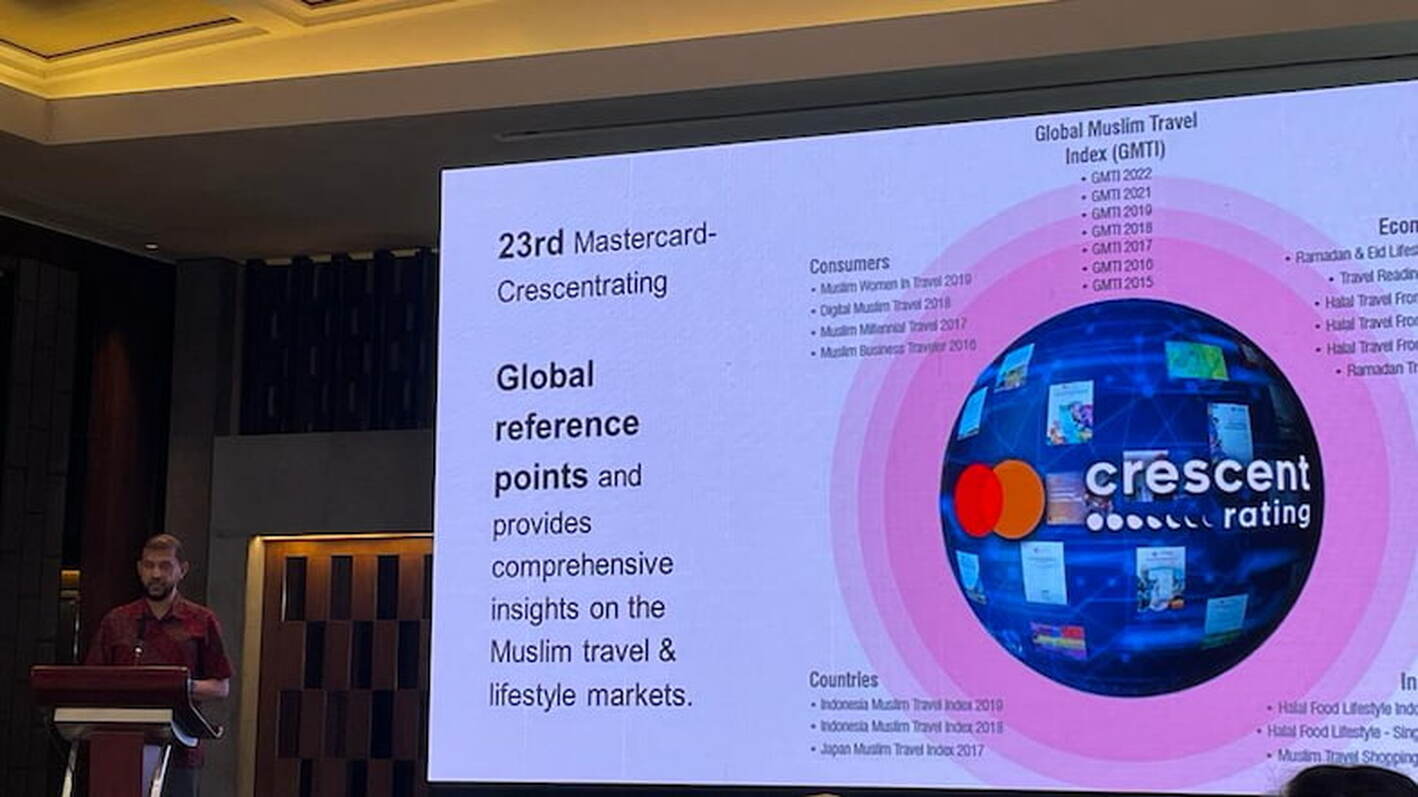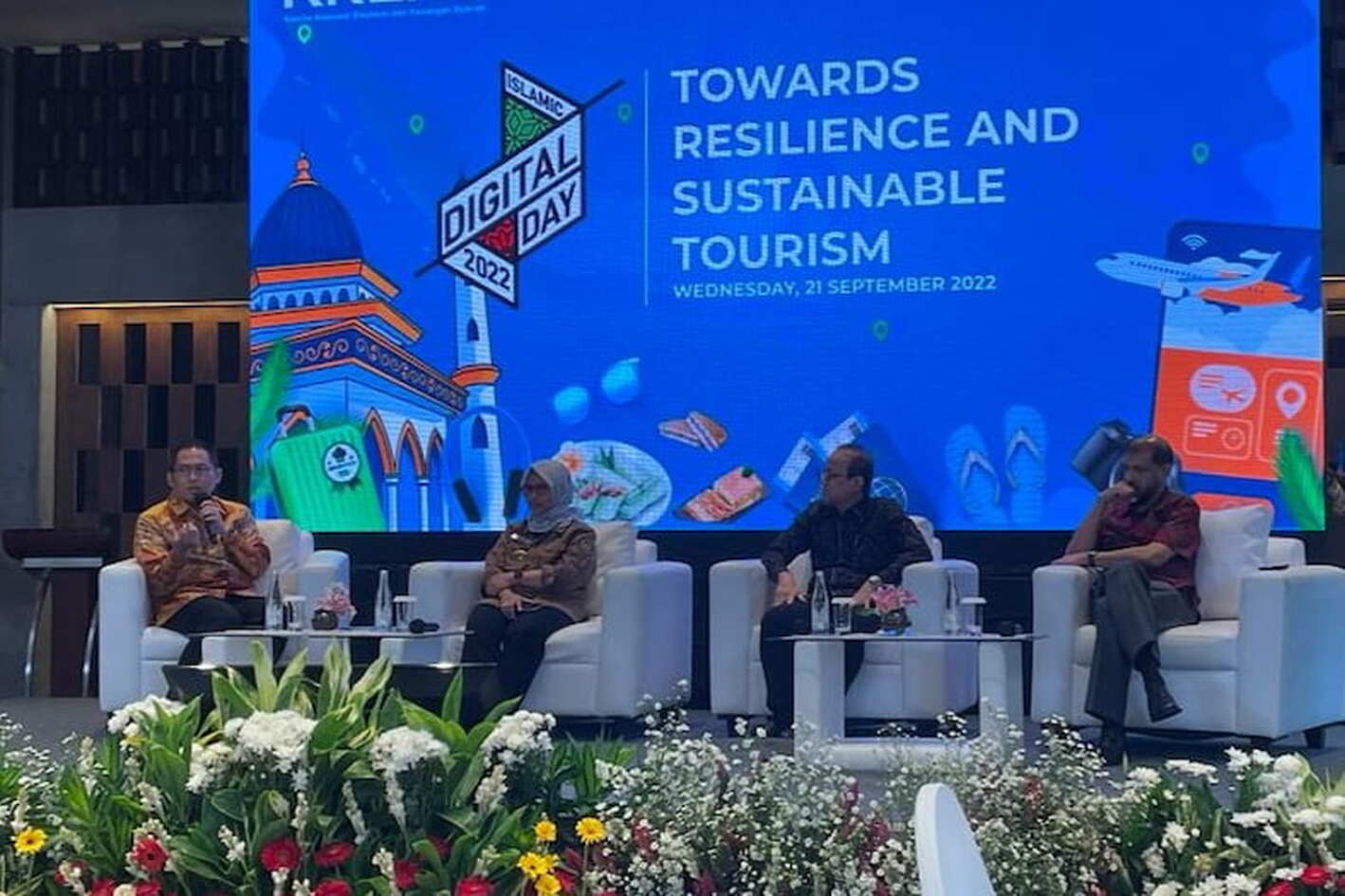Jakarta, 21 September 2022 – Komite Nasional Ekonomi dan Keuangan Syariah (KNEKS) opened its door for the Islamic Digital Day 2022 which carries the theme of "Towards Resilience and Sustainable Tourism". The Minister of Tourism and Creative Economy, institutions, associations, academics, tourism industry business players and multiple regional representatives in Indonesia attend the one-day event.

Fazal Bahardeen, the CEO of CrescentRating and HalalTrip, is invited to give an in-depth presentation on the Global Muslim Travel Index (GMTI) and how it could help halal travel and tourism to flourish through the report. The GMTI functions as a parameter for Muslim-friendly travel destinations with the aim of tracking the health and growth in four strategic areas – access, communications, environment, and services.
The importance of halal tourism and Muslim-friendly destinations would also be revealed to be much more important as a strategic plan due to the increasing number of Muslims growing constantly in the upcoming years. It is expected that by 2040, the Muslim population would increase substantially and reach 30 percent of the world's population.
.jpg)
Although the number of Muslim tourists has reached 160 million visitors worldwide in 2019, the recent pandemic has affected these numbers and projected tourism goals. Now, as travel continues and increases in size post-pandemic, Indonesia aims to increase tourism and its potential through optimizing Muslim-friendly tourism. With the recent bounce-back in travel and awareness of Muslim-friendliness, it was revealed that Indonesia has ranked 2nd with a final score of 70 based on the Global Muslim Travel Index (GMTI) 2022.
Sandiaga Uno, Minister of Tourism and Creative Economy, has also expressed his wishes that by 2025, Indonesia will be able to manage and increase its score from 70 to 75 with hopes that it’ll bring the country to the first rank. With Indonesia that is focusing on the growth of the sharia ecosystem and Islamic finance, the minister hoped that in the near future, these growths would also help the country in adapting and increase the country's competitiveness in establishing the country as the ideal Muslim-friendly destination.

During the event, the Ministry of Tourism and Creative Economy (Kemenparekraf) alongside KNEKS also released a guidebook where it would consist of the “Five Muslim-friendly Super Priority Destinations in Indonesia”. The guidebook features Lake Toba, Borobudur, Mandalika, Labuan Bajo, and Likupang as the five Muslim-friendly super-priority destinations and includes attractions, activities, foods, and amenities in these destinations.
The guidebook is released with the intention of helping tourists in getting to know these destinations while enabling businesses and other stakeholders to reflect on, maximize its services regarding Muslim-friendliness, and also get prospective visitors to be aware of these destinations. With the release of the guidebook and GMTI as one of the matrices for Indonesia’s halal tourism, the minister hoped that every party that is involved in the tourism industry will be propelled in building halal tourism through Muslim friendliness efforts as an extended service and hence be able to welcome guests from Indonesia and all around the world.
Aside from the increasing Muslim population, there are three main demographic groups that determine the pace and growth of halal tourism. Fazal Bahardeen,, revealed that millennials, gen z, and Muslim woman travelers are the main groups that propelled and started the trend of Muslim-friendly tourism. With the increasing consciousness and consumer behavior of these Muslim groups, Muslim-friendly travels and destinations would increase in popularity, where efforts on improving and catering to these groups of travelers in this industry are highly recommended.
Digitalization and adaptation to the market would also come as a key factor and would also be the key focus on the restoration and rise of Indonesia’s tourism. Due to the recent pandemic, Indonesia aims on shifting to quality and sustainable tourism by focusing on hygiene, low mobility, low touch, and less crowd. This is one of the ways to create and achieve Muslim-friendly destinations during the post-pandemic era as extended services in Indonesia.
With the currently ongoing digitalization and popularity of both Muslim-friendly travels and Indonesia, a top-down effort in revitalizing and maximizing this sector would be a much more important business for multiple players in the industry. Putting Muslim-friendliness as a key market and creating a domestic market that could impact the global market would be one of the most effective ways in order to create a halal ecosystem.
To reach that height and maximize the digitalization efforts, focusing on travels aside from umrah and hajj such as through Islamic heritage travels, educating the industry through constant programs, marketing the country as Muslim-friendly, improving facilities, providing halal assurance through halal certifications especially to cater for international travelers, and being consistent in its halal tourism would be the steps that Indonesia would need to take to improve and make it to the number one spot GMTI rankings.
Download GMTI report